About Curaçao National Export Strategy (NES)
The NES is Curaçao’s 5-year path to diversify exports, drive economic development and increase foreign exchange earnings. The strategy is centered on “e-government for business” to facilitate exports and help Curaçao emerge as a more resilient and more sustainable economy, notably after the effects of the COVID-19 pandemic.

The NES vision reflects the country’s ambition to transform its economy into one that is driven by entrepreneurship, efficiency, cost-effectiveness, quality, and innovation. It is aimed at local businesses and foreign investors alike, positioning Curaçao as a hub for successful business ventures.
The NES is built on strong analytical diagnostics and the expertise of practitioners. Priorities and actions between the government and the entire export community represent a consensus about what is needed to boost the country’s trade performance. It lays out a detailed roadmap for faster export growth and acknowledges that things need to be done differently to increase trade’s contribution to the country’s economic development.
The strategy focuses on transforming the economic makeup of the country by upgrading and creating new value chains, particularly in service exports. The NES priority sectors are chosen through extensive stakeholder consultations. These include the blue bioeconomy, creative industries, education services, financial services, information technology (IT) services, and port and maritime services.
The NES aims to improve the business environment for all enterprises in all sectors. The NES addresses the conditions for competitiveness by resolving cross-cutting constraints and improving overall trade support services. Individual strategies have been designed in areas that affect all exporters, these include skills and entrepreneurship, trade- facilitation, trade information, and trade and investment promotion.
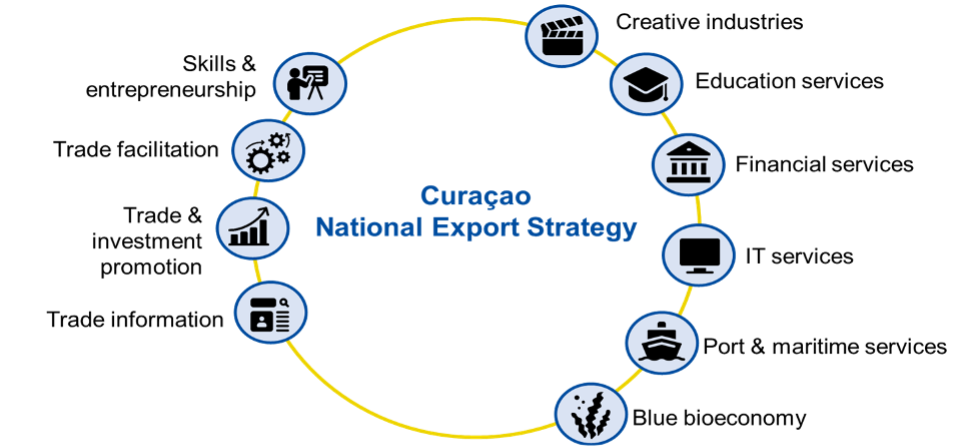
The NES proposes a clear-cut strategic orientation to drive reforms around three cross-cutting strategic and operational objectives designed to improve the foundations for doing business in Curaçao. Overall, the NES seeks to:
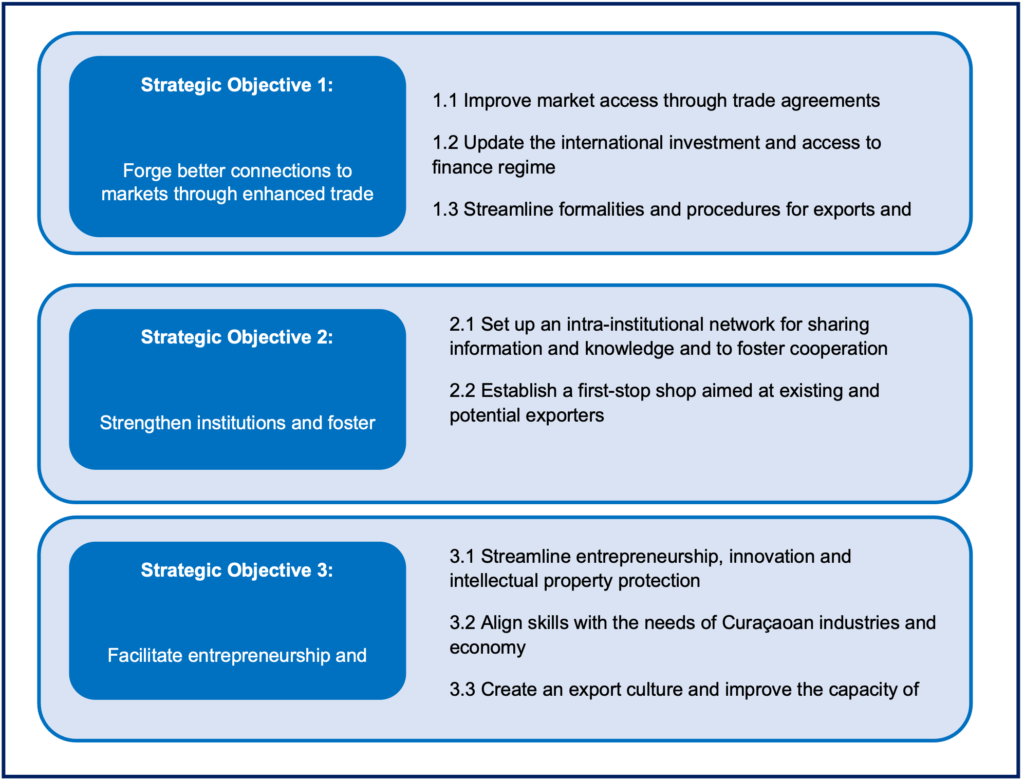
The achievement of the above strategic objectives will require agility and commitment from policymakers and will depend on the following critical success factors:
- Adopting policies and legislation in a timely manner
- Rejuvenating and alignment of institutional ecosystem
- Leveraging digital technologies and transforming
- Curaçao’s service delivery through e-government
- Creating a conducive business environment
- Aligning skills production infrastructure to private sector needs
- Building a national export culture and diversifying exports
Implementing the NES will drive economic growth.
It will:
- Unlock the development potential of emerging export sectors to provide new job opportunities and generate new skills locally.
- Enable micro, small, and medium-sized enterprises (MSMEs) and start-ups to begin exporting through the provision of better trade services, including trade information and trade promotion.
- Position the country strongly as a player in the region.
- Help ease administrative procedures to reduce the costs of doing business for start-ups, MSMEs, and exporters, thereby fostering further entrepreneurship and innovation.
“Curaçao – where business succeeds”
Creative Industries
Creative industries have great potential to generate economic value, foster innovation and contribute to the well-being of people engaged in the sector. Film, music, digital design, new media, and software are just a few of the wide range of subsectors that fall under the umbrella of the creative industries.
The creative industries sector can serve as a catalyst for social, technological, and economic change that leverage people’s creative energy and resources.

Education Services
The export of education services in Curaçao represents an important growth opportunity and a contributor to foreign exchange earnings, jobs, and tax revenues. A vibrant education services sector supports skills production and innovation in a range of other sectors, leading to large and positive economic and social spillovers.
Curaçao has made good progress towards strengthening its exports of educational services.
It has leveraged its natural and legal environment, culture, and language diversity to attract foreign students and educational institutions.
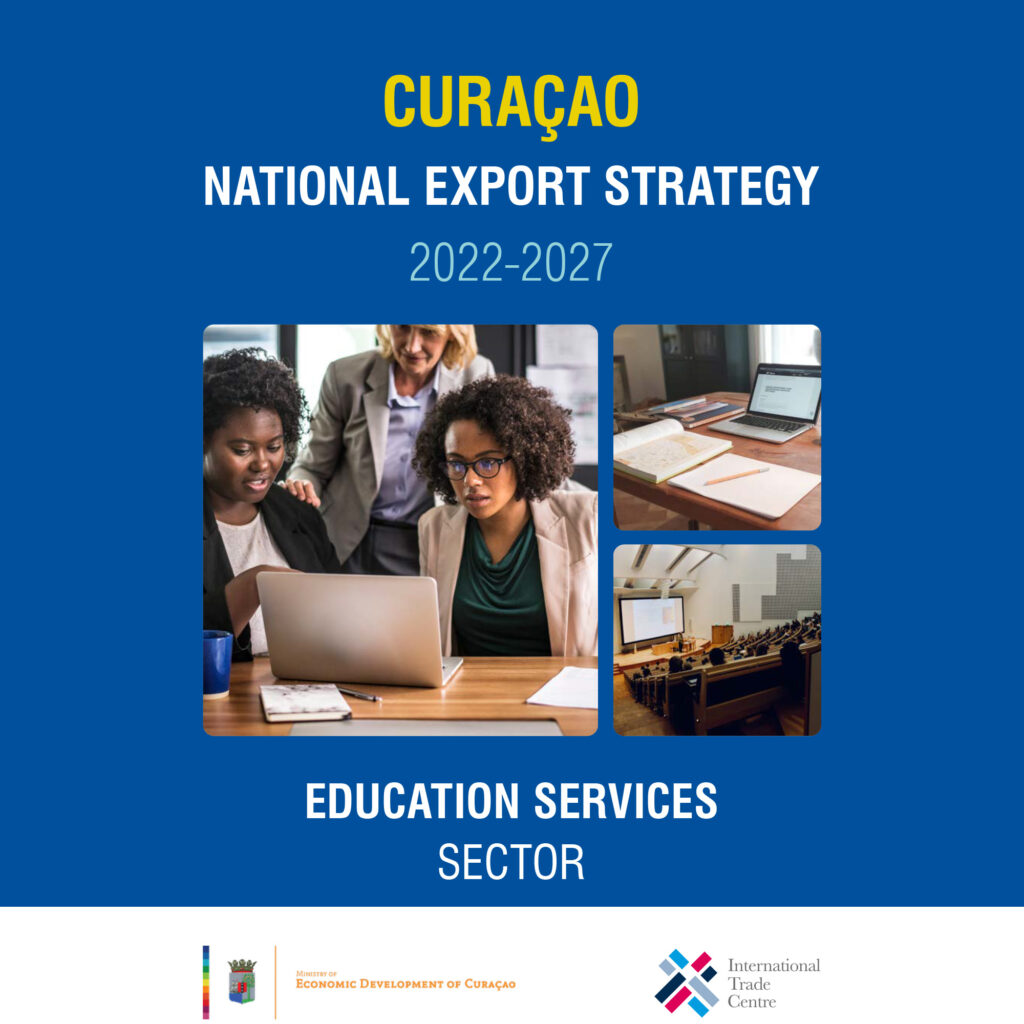
Financial Services
The financial services sector has historically been one of the main pillars of Curaçao’s economy. Driven by its entrepreneurial spirit, it has built a legacy by delivering high-quality services and generating high-income employment.
With its strategic geographical location, multilingual and multicultural society, and developed infrastructure, the sector continues to hold unique growth potential.
This strategy identifies the need to upgrade the sector’s operational framework to efficiently implement legislation and regulations needed to meet international market standards.
It has leveraged its natural and legal environment, culture, and language diversity to attract foreign students and educational institutions.
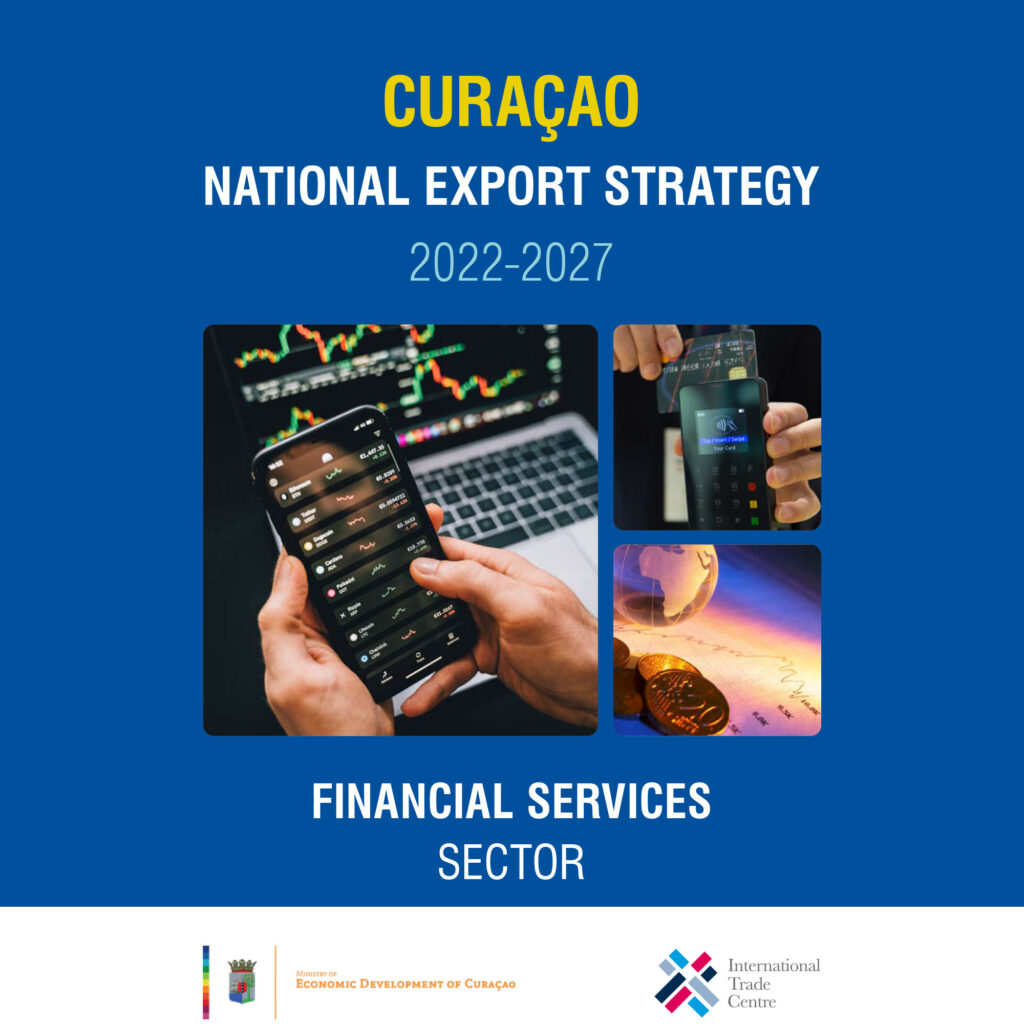
IT Services
Curaçao is well-positioned to take advantage of the strong global growth in the demand for information
technology services. Curaçao possesses one of the most developed ICT infrastructures in the Caribbean region and therefore a home for Digital Nomad and Remote workers. It is also home to several prestigious ICT facilities like an E-Commerce Park, internet exchange (Amsterdam Internet Exchange, or AMS-IX Caribbean), and several advanced data centers, including a Tier IV certified data center (Blue NAP Americas), which hosts some of the region and world’s largest companies.
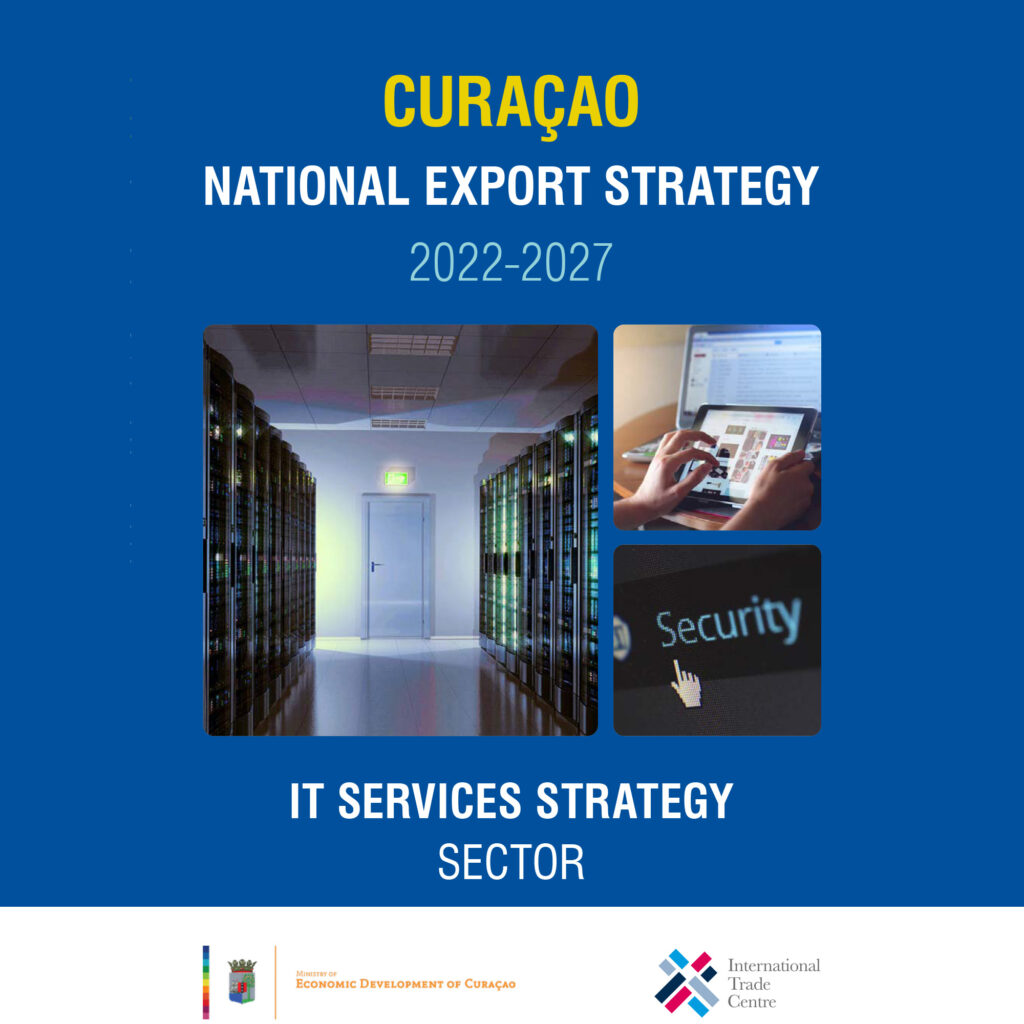
Port & Maritime Services
Curaçao’s port and maritime sector enables the island to play an important role in regional commerce due to its location, stable political conditions, and deep and wide naturally sheltered main harbor.
In the face of increasing competition between ports, Curaçao is in a stronger position to enhance competitiveness by first strengthening maritime support services rather than targeting infrastructure investments.

Blue Bioeconomy
Curaçao can take significant strides in the blue bioeconomy sector (bioprospecting) exploring new valuable chemical compounds, genes, and natural products that can lead to biotechnological and commercial applications and open new business opportunities for the island.
Curaçao is surrounded by a fringing reef with a total surface of 103 km² that gives access to an important stock of marine genetic resources, coastal biodiversity, and ecosystems.
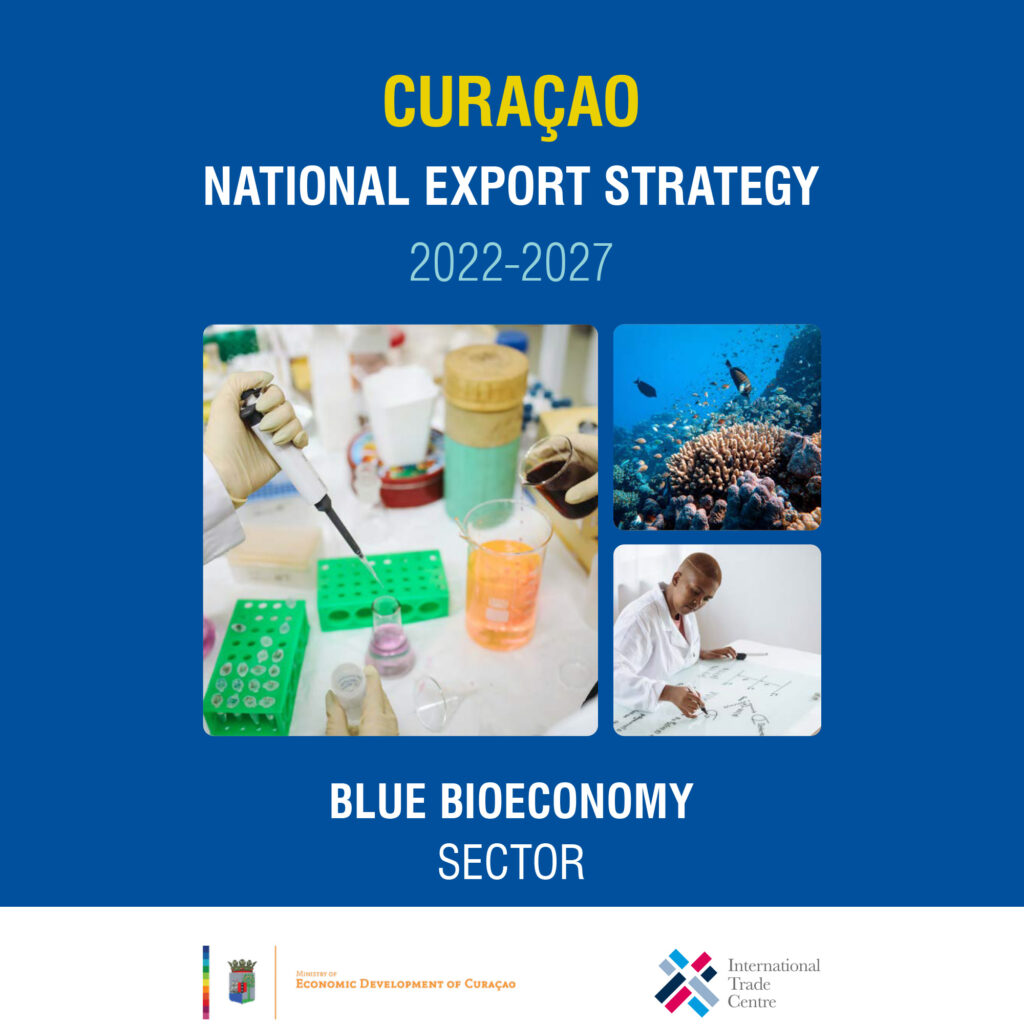
Skills and Entrepreneurship
New business creation or entrepreneurship is crucial to SME development and is a vital ingredient to a country’s economic development. A high level of entrepreneurship has been associated with long-term economic growth, higher productivity growth, and job creation.
Effective entrepreneurship education policies and programs focus on developing competencies to stimulate the development of new and innovative companies.
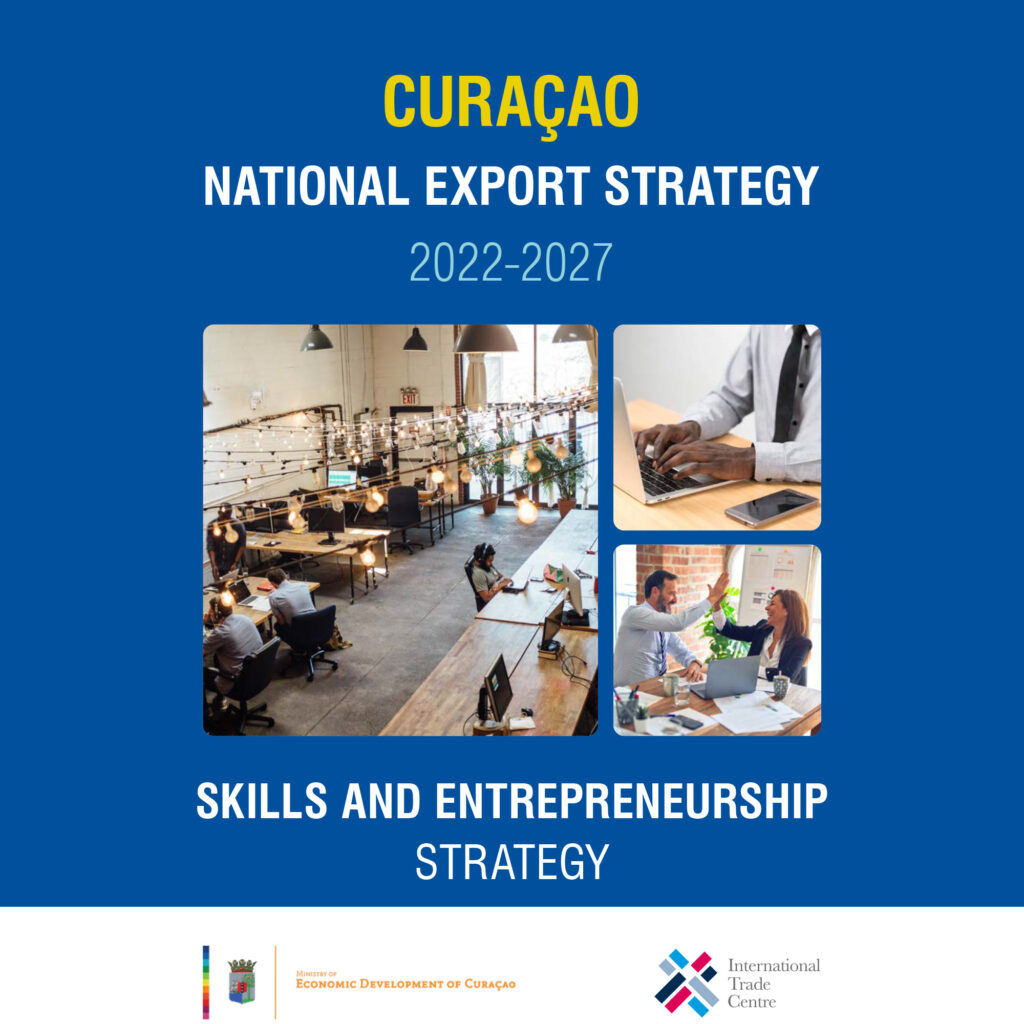
Trade Facilitation
Trade facilitation is defined as the simplification, standardization, and harmonization of export and import processes. It plays a key role in a country’s competitiveness. Curaçao has engaged in several efforts to improve trade facilitation and efficiency through digitalization and e-government initiatives. This strategy aligns these efforts to ensure the best use of institutional resources and target export development in the country.
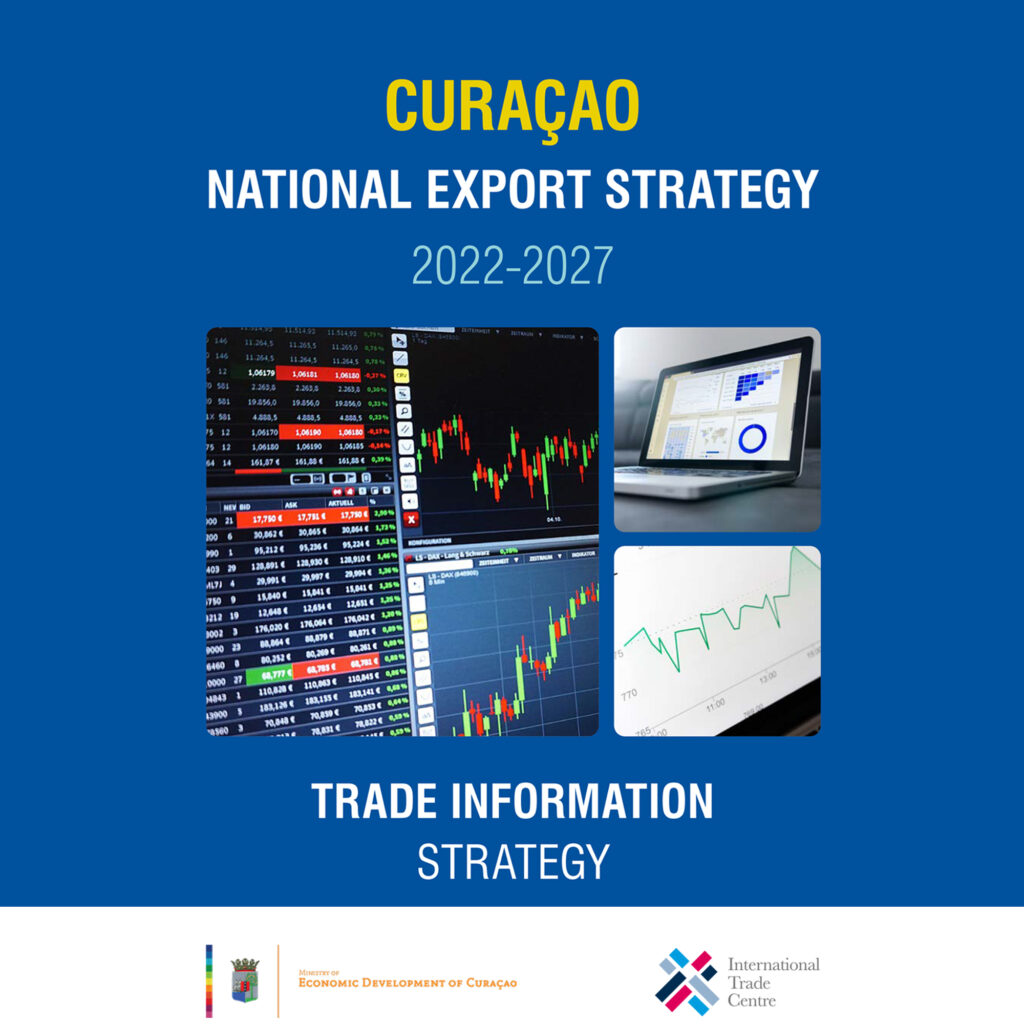
Trade and Investment Promotion
Trade and investment promotion comprises a set of economic policies, interventions, and initiatives. Aimed at growing exports in target markets, encouraging investments into strategic sectors, and establishing the Curaçao brand.
This strategy ensures that there is efficient coordination and leadership among key institutions to boost investment and trade promotion efforts.

Medical & Wellness Tourism
Curaçao’s MWT sector has significant growth potential. It is a high-value niche export sector with a strong ability to enhance the country’s foreign exchange earnings. The government, tourism officials, and actors in the medical and wellness industry have long envisaged the development of this sector. However, efforts to develop it have been sporadic. A common strategic direction and detailed operational plans are needed to unlock the sector’s contribution to the economy and people of Curaçao.




